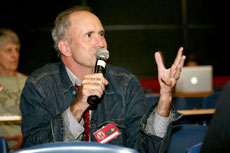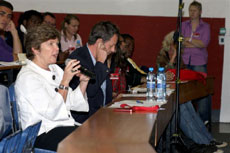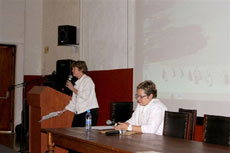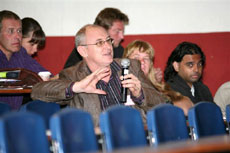
Alan Taylor, Tshwane University of Technology

Thandi Brewer, AFDA Industry Chair for screenwriting (background) & Rob Malpage, AFDA Alumni Cinematographer & (foreground) Helen Kuun, Independent Film Distributor

Gina Bonmariage, Postgraduate Course Director, AFDA Johannesburg

(Background) Gina Bonmariage, Postgraduate Course Director, AFDA Johannesburg

Damian Garside, North West University Mafikeng campus

Speaker Lloyd Power, Head of producing AFDA JHB
The conference was hosted on behalf of CARA (CILECT Africa Regional Association).
CILECT (Centre International de liaison Des Ecoles De Cinema Et De Television), established in Cannes in 1954, is an international organisation that represents over 148 film, television and media schools.
Garth Holmes, Chairman of AFDA and of CARA, launched the Association's 2011 calendar with the conference. The conference was attended by Henry Verhasselt (Executive Secretary of CILECT), Marc Nicolas (Chairman of the European Grouping of Film and Television Schools), and Maria Dora Dourao (Universidade de Sao Paulo and Chairperson of CILECT Ibero America).
The conference brought academics from Film and Media Studies Departments at various South African universities and a variety of industry professionals together. Four broad focus areas were debated: "Trends in Formats, Distribution and Exhibition"; "Film Analysis"; "Reflections on Documentary Filmmaking in Africa," and "Trends in Teaching Methodologies & Lessons Learnt in Film Production".
The value of exchanging ideas between academia and industry professionals was evident from the first plenary session, titled "The impact of new media on the writing, production, postproduction, exhibition and distribution of motion picture entertainment product." The session was led by AFDA's Industry Chairs of Producing and Screenwriting, namely Jeremy Nathan and Thandi Brewer. The discussion provided a clear indication to the audience on how film school curricula should take the shifting landscape of film production and new media into account.
Keyan Tomaselli (Centre for Communication, Media and Society, University of KwaZulu Natal) invited researchers from other institutions to partake in a research project called "Media Cities South Africa: A Network Analysis". The project includes supporting and tracking the progress of the ReaGile Project, which intends to place industrial containers which have been customised to be cinemas, in townships and rural areas where access to conventional cinemas is severely restricted.
Other issues which impact on film production and distribution and exhibition as we know it were hotly debated in sessions to follow. Alette Schoon from the Journalism and Media Studies Department at Rhodes University discussed teaching television journalism using the mobile phone.
Shmerah Passchier from AFDA Johannesburg argued for the viability of the Nollywood distribution model in the South African context. Memory Mabika from the University of Venda presented a case study on the impact of piracy on film distribution and exhibition in rural areas. Ernest Nkosi from AFDA Johannesburg questioned the limitations in current distribution models and investigated straight to DVD sales as an alternative form of distribution. Helen Kuhn, an independent distributor from Indigenous Films, provided some valuable facts and statistics on box office performance of South African films over the past few years.
In the focus area on teaching methodologies, topics ranged from conceptual insights into audience engagement theories in screenwriting and editing, and psychological approaches to choices made in costume design and styling; right through to very practical considerations such as LED lighting as an alternative to conventional lighting, and ways to use title sequencing to frame a film's genre and narrative for audiences.
The following papers were presented: "Fego DNA Schemas: The Projection of Schematic Constructed Anxiety within Character Dress" by Michael Ivy of AFDA Cape Town;" Cutting real: Self-reflexive Editing Devices in contemporary South African Documentary Film" by Liani van Straaten, a freelance filmmaker and academic; "Rethinking Title Sequence Education: A Model for Tertiary Teaching for Motion Picture Students" by Wicus Labuschagne of AFDA Cape Town; "Towards an Automated Interactive Reflexive Learning Environment for Teaching Composition in Film' by Doug Armstrong of AFDA Cape Town, "The adaptive value of narrative engagement: Theorising narrative comprehension through empathic identification" by Dante Greeff of AFDA Cape Town; "LED lighting in an Emerging Local Market" by Charles Deacon of AFDA Cape Town;" Constructive Media: Breaking the Pattern" by Karen Kuhn of AFDA Cape Town and "Applying a Competency Grid to Film and Video Training" by Attie Gerber of the North-West University, Potchefstroom Campus.
In the areas of film analysis and documentary filmmaking Lieza Louw from the Wits School of Arts investigated geographical aesthetics in South African films, with reference to District 9, Fiela se Kind, Kringe in 'n Bos and Liefling. Damian Garside of North West University also looked at District 9, as well as Jerusalema, and analysed the ways in which these films characterise the unfolding logic of South African modernity. Janina Wozniak of the Nelson Mandela Metropolitan University spoke to "Le Malentendu Colonial" ("The Colonial Misunderstanding", 2004) directed by Jean-Marie Teno of Cameroon. She explored the complex relationship that contemporary Africans have with their colonial, missionary history.
According to Anton Basson (conference convenor and the Chairman of AFDA's Academic Research Committee) the conference was a rare opportunity for academics from institutions of higher learning to interface with cutting edge thinking in industry. Tomaselli agreed with this sentiment and also commented on the healthy mix of academic and production orientated papers.
Bata Passchier, CEO of AFDA, closed the event with an invitation to all institutions to participate in research projects in conjunction with industry under the banner of CARA. By doing so they will ensure that film school curricula remains relevant for the 21st millennium.
The full programme and paper abstracts are available on the CILECT website (www.cilect.org.)
